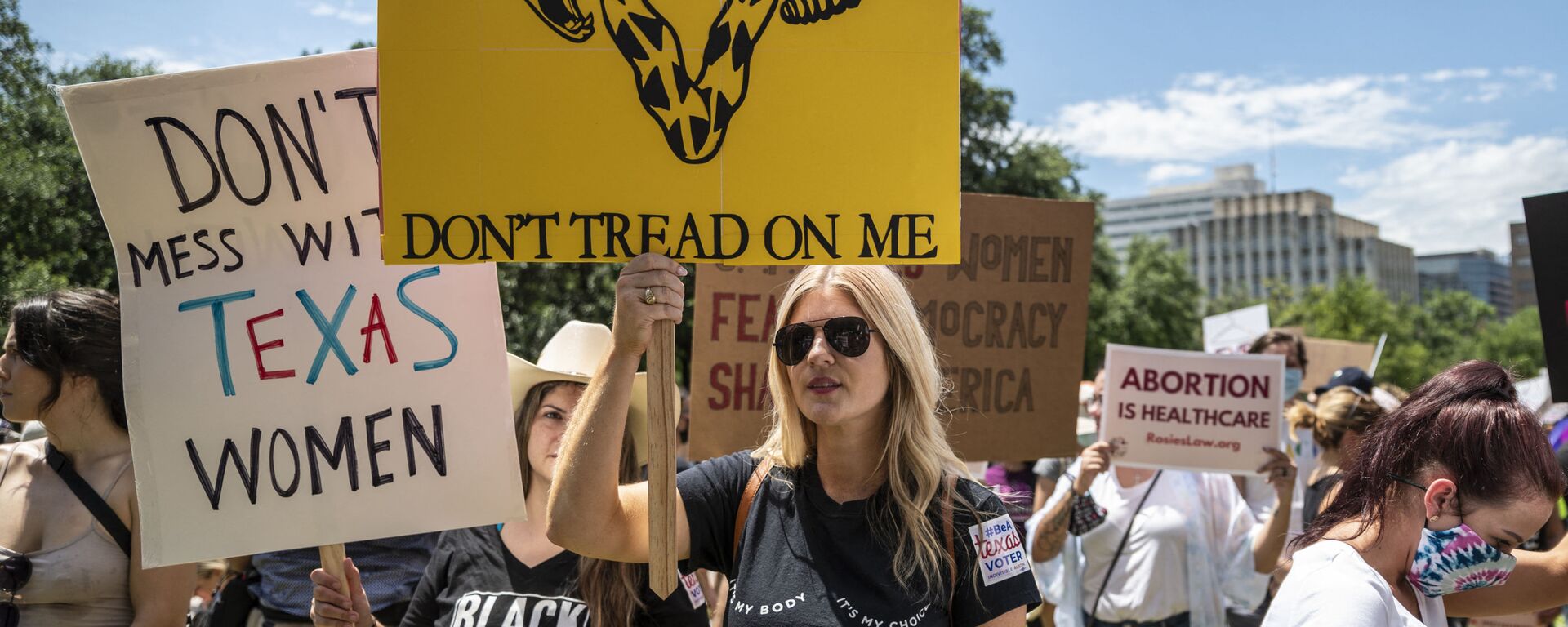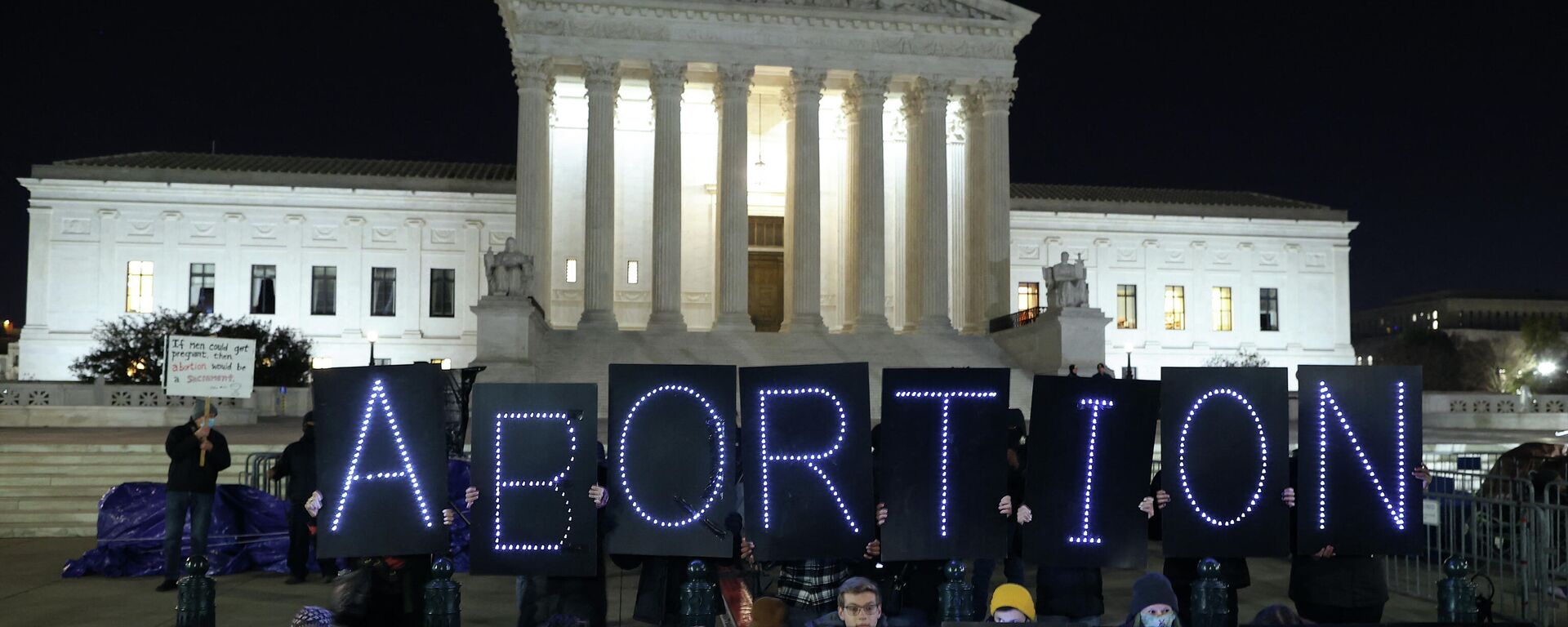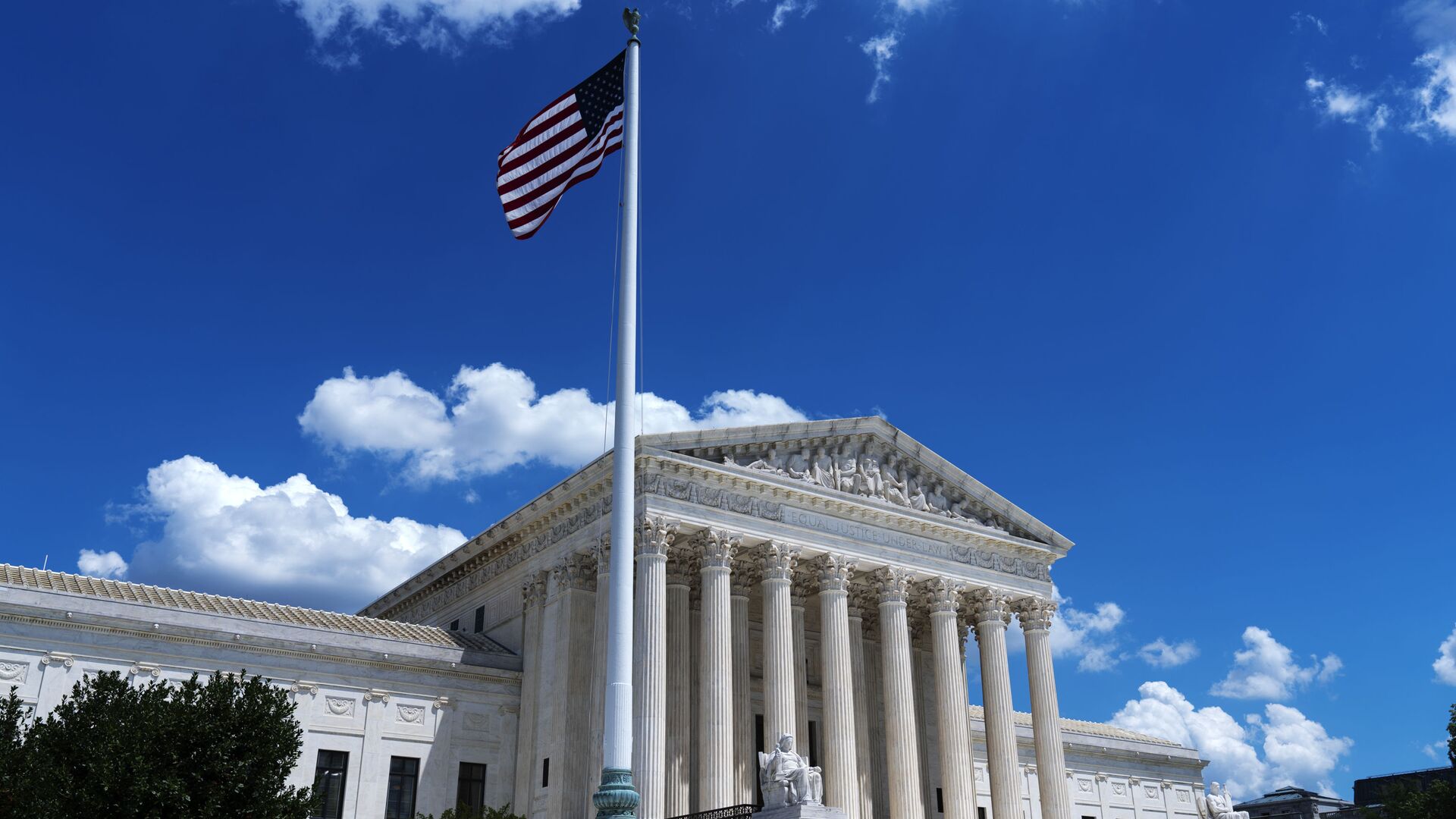https://sputnikglobe.com/20211202/why-scotus-cant-ban-abortion--what-the-hype-over-roe-v-wade-is-about-1091203794.html
Why SCOTUS Can't 'Ban' Abortion & What the Hype Over Roe v Wade is About
Why SCOTUS Can't 'Ban' Abortion & What the Hype Over Roe v Wade is About
Sputnik International
The Supreme Court heard arguments in the Dobbs v Jackson Women’s Health Organisation case on 1 December to decide the fate of Mississippi’s ban on abortion... 02.12.2021, Sputnik International
2021-12-02T15:09+0000
2021-12-02T15:09+0000
2022-12-19T14:00+0000
us supreme court
roe v. wade
mississippi
world
us
opinion
women's rights
abortion
republicans
conservative
https://cdn1.img.sputnikglobe.com/img/07e5/07/01/1083285915_0:160:3073:1888_1920x0_80_0_0_872bd27a8e4fc0a8e18bf2681975de75.jpg
The Mississippi law prohibits most abortions after 15 weeks of pregnancy, allowing them only in medical emergencies or cases of severe foetal abnormality. The threshold of 24 weeks for the procedure was earlier stipulated by Roe v Wade, the 1973 Supreme Court decision which ruled that access to abortion is a constitutional right.While SCOTUS is considering whether to discard the court's previous standards under the 1973 ruling, American conservatives are calling upon the Court to shred Roe v. Wade altogether. In July 2021, the state of Mississippi asked the court to reconsider the landmark 1973 abortion ruling. Mississippi Attorney General Lynn Fitch argued that Roe v. Wade was "egregiously wrong."Liberals fear that the court's conservative majority will lend a sympathetic ear to calls from the GOP and overrule Roe v. Wade, and place the burden of regulating abortion issues on US states.Earlier this year, SCOTUS' refusal to block Texas' "Heartbeat Act," banning abortions as early as six weeks into term, unnerved liberal observers, triggering further concerns about Roe v. Wade's fate. Democrats started considering ways to protect Roe at the federal level and renewed debate over "packing" the Court with more liberal justices.Mississippi Law's 15 Weeks ThresholdSCOTUS' major focus in the case is whether prohibiting abortions after 15 weeks is an undue burden on reproductive freedom, according to Sedler. The undue burden standard stipulates that a legislature cannot make a particular law that is too burdensome or restrictive of one's fundamental rights.The "viability standard" is a scientifically determined idea about whether a foetus could survive outside the womb. The standard has long been a subject of debate among conservatives who argue that "viability" is not a way to judge a human life.Lawyers for Jackson Women's Health Organisation (JWHO), a state-licensed abortion clinic in Mississippi, for their part, argue that the court should not depart from the viability standard.While the state's law makes an exception for "severe foetal abnormality," it doesn't define it, the professor notes. According to him, the court could say that this term is too vague, so the law is unconstitutional for that reason. On the other hand, SCOTUS could say that because the term is not defined, it is up to the woman and the doctor to decide, Sedler continues. He suggests that the Court "could then hold that because the law only prohibits purely elective abortions after 15 weeks, it is not an undue burden on reproductive rights."Does Potential Over-ruling of Roe Spell Real Danger?There are no grounds for alarmism concerning the court's upcoming decision, Sedler believes. For her part, Michelle Oberman, Katharine and George Alexander professor of law at Santa Clara University School of Law, holds a different stance.However, Andrew C. McCarthy, former Assistant United States Attorney for the Southern District of New York, insists that the apocalyptic approach to SCOTUS' handling of Dobbs v Jackson Women’s Health Organisation is over-exaggerated by the left-leaning media."In reality, the Supreme Court has no power to 'ban' abortion," the lawyer wrote in his op-ed for National Review. "If it renounces the jurisprudential malpractice that is Roe, the Court will simply be saying what has always been apparent: The Constitution has nothing to say about the procedure, neither mandating nor prohibiting access to it. Like most matters, it is left to the states to regulate."According to McCarthy, "life will go on mostly as before" and "the disappearance of Roe will barely be noticed."Still, while there's some possibility that the Court will place Roe v. Wade "on history’s ash heap," that's a big "if," according to McCarthy, who is skeptical about such an outcome.
https://sputnikglobe.com/20210908/doj-has-few-options-against-texas-abortion-law-mississippi-case-brings-new-risks-legal-experts-say-1088887400.html
https://sputnikglobe.com/20211201/as-mississippi-abortion-case-heads-to-supreme-court-dem-warns-of-revolution-if-roe-v-wade-repealed-1091165972.html
mississippi
Sputnik International
feedback@sputniknews.com
+74956456601
MIA „Rosiya Segodnya“
2021
News
en_EN
Sputnik International
feedback@sputniknews.com
+74956456601
MIA „Rosiya Segodnya“
Sputnik International
feedback@sputniknews.com
+74956456601
MIA „Rosiya Segodnya“
us supreme court, roe v. wade, mississippi, us, opinion, women's rights, abortion, republicans, conservative, democrats
us supreme court, roe v. wade, mississippi, us, opinion, women's rights, abortion, republicans, conservative, democrats
Why SCOTUS Can't 'Ban' Abortion & What the Hype Over Roe v Wade is About
15:09 GMT 02.12.2021 (Updated: 14:00 GMT 19.12.2022) The Supreme Court heard arguments in the Dobbs v Jackson Women’s Health Organisation case on 1 December to decide the fate of Mississippi’s ban on abortion after 15 weeks of pregnancy. Although SCOTUS is unlikely to make a decision before the end of June 2022, the case has prompted a fierce nationwide debate.
The Mississippi law prohibits most abortions after 15 weeks of pregnancy, allowing them only in medical emergencies or cases of severe foetal abnormality. The threshold of 24 weeks for the procedure was earlier stipulated by Roe v Wade, the 1973 Supreme Court decision which ruled that access to abortion is a constitutional right.
While SCOTUS is considering whether to discard the court's previous standards under the 1973 ruling, American conservatives are calling upon the Court to shred Roe v. Wade altogether. In July 2021, the state of Mississippi asked the court to reconsider the landmark 1973 abortion ruling. Mississippi Attorney General Lynn Fitch argued that Roe v. Wade was "egregiously wrong."
"The conclusion that abortion is a constitutional right has no basis in text, structure, history or tradition," wrote Fitch in papers filed to the court.
Liberals fear that the court's conservative majority will lend a sympathetic ear to calls from the GOP and overrule Roe v. Wade, and place the burden of regulating abortion issues on US states.
Earlier this year,
SCOTUS' refusal to block Texas' "Heartbeat Act," banning abortions as early as six weeks into term, unnerved liberal observers, triggering further concerns about Roe v. Wade's fate. Democrats started considering ways to protect Roe at the federal level and renewed debate over "packing" the Court with more liberal justices.
"There has been enormous media hype about this case," says Robert A. Sedler, an emeritus distinguished law professor at Wayne State University Law School specialising in US Constitutional law. "There has been a lot of discussion about the Court overruling Roe v. Wade, because there is now a conservative majority on the Court. Ignore the hype! Conservative majority or not, the Court works as an institution. It will not reach out and overrule a case, especially one like Roe v. Wade, which is almost 50 years old."

8 September 2021, 17:00 GMT
Mississippi Law's 15 Weeks Threshold
SCOTUS' major focus in the case is whether prohibiting abortions after 15 weeks is an undue burden on reproductive freedom, according to Sedler. The undue burden standard stipulates that a legislature cannot make a particular law that is too burdensome or restrictive of one's fundamental rights.
"The state's lawyers spent most of their time asking the Court to overrule Roe," the professor says. "But they argued that changing the viability standard to 15 weeks is not an undue burden, because 95% of abortions are performed during that time."
The "viability standard" is a scientifically determined idea about whether a foetus could survive outside the womb. The standard has long been a subject of debate among conservatives who argue that "viability" is not a way to judge a human life.
Lawyers for Jackson Women's Health Organisation (JWHO), a state-licensed abortion clinic in Mississippi, for their part, argue that the court should not depart from the viability standard.
While the state's law makes an exception for "severe foetal abnormality," it doesn't define it, the professor notes. According to him, the court could say that this term is too vague, so the law is unconstitutional for that reason. On the other hand, SCOTUS could say that because the term is not defined, it is up to the woman and the doctor to decide, Sedler continues. He suggests that the Court "could then hold that because the law only prohibits purely elective abortions after 15 weeks, it is not an undue burden on reproductive rights."

1 December 2021, 09:43 GMT
Does Potential Over-ruling of Roe Spell Real Danger?
There are no grounds for alarmism concerning the court's upcoming decision, Sedler believes. For her part, Michelle Oberman, Katharine and George Alexander professor of law at Santa Clara University School of Law, holds a different stance.
"The US appears poised to enter an era in which states will be permitted to make abortion a crime," Oberman presumes. "It will be a time of legal chaos. Abortion will remain legal in 21 states, while lawmakers in the other 29 will endeavour to enact abortion laws that will satisfy constituents who elected them, at least in part, on a promise that they would do something about abortion."
However, Andrew C. McCarthy, former Assistant United States Attorney for the Southern District of New York,
insists that the apocalyptic approach to SCOTUS' handling of Dobbs v Jackson Women’s Health Organisation is over-exaggerated by the left-leaning media.
"In reality, the Supreme Court has no power to 'ban' abortion," the lawyer wrote in his op-ed for National Review. "If it renounces the jurisprudential malpractice that is Roe, the Court will simply be saying what has always been apparent: The Constitution has nothing to say about the procedure, neither mandating nor prohibiting access to it. Like most matters, it is left to the states to regulate."
According to McCarthy, "life will go on mostly as before" and "the disappearance of Roe will barely be noticed."
Still, while there's some possibility that the Court will place Roe v. Wade "on history’s ash heap," that's a big "if," according to McCarthy, who is skeptical about such an outcome.






